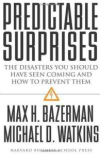
Predictable Surprises: The Disasters You Should Have Seen Coming, and How to Prevent Them
Max H. Bazerman, Michael D. Watkins
Were the terrorist attacks of September 11, 2001predictable -- or were they a surprise? And what about the rapid death spirals of Enron and Arthur Andersen? In each case, they were “predictable surprises.”
Predictable means that there were enough warning signs to suggest that a tragedy was likely. Surprise means that organizations didn’t view the signs with enough urgency to prevent the tragedy.
In our riveting summary of Predictable Surprises, Max H. Bazerman and Michael D. Watkins of Harvard Business School, who are leading experts in managerial decision making, explain why predictable surprises are so common in business and society.
They also provide a systematic framework that leaders can use to recognize and prioritize brewing disasters and mobilize their organizations to prevent them.
In human, organizational, and economic costs, predictable surprises can be devastating. So, it’s up to leaders to anticipate -- and avoid -- them.
This summary will show you how to do that by using a three-step framework to avoid predictable surprises:
- Recognize emerging threats.
- Prioritize those threats.
- Mobilize to prevent the threats from becoming a reality.


